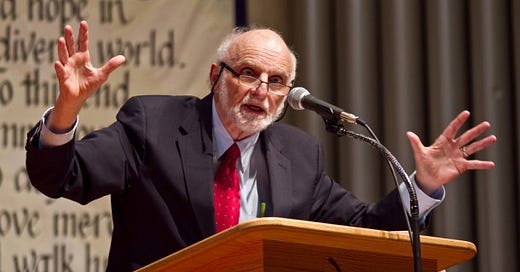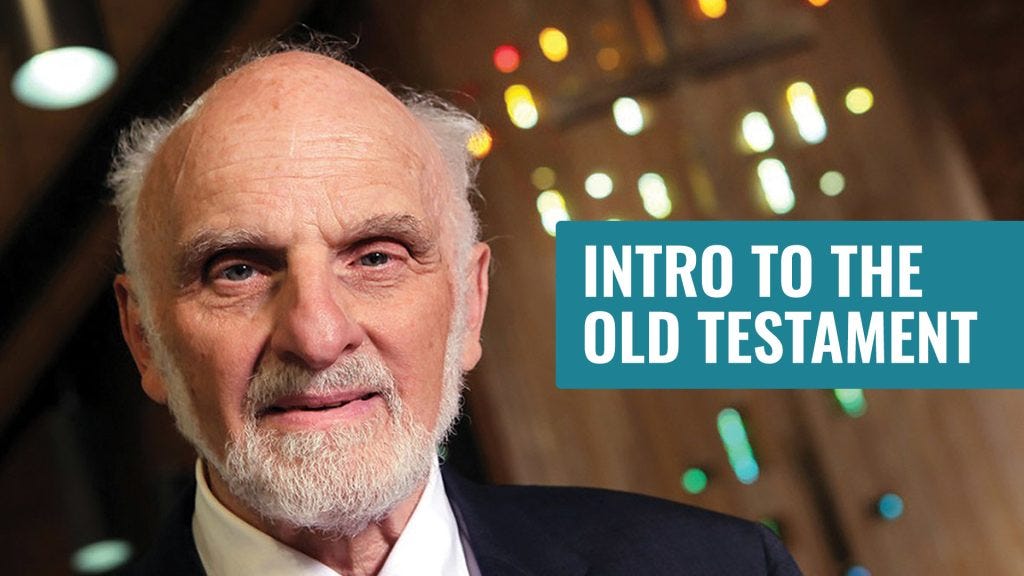The Strange Fidelity of God: A Lecture by Walter Brueggemann
Homebrewed Christianity Podcast with Tripp Fuller
Introduction
I have been studying the Old Testament all my life, and I keep discovering how the God who occupies the Old Testament or Hebrew Scripture is so unlike the God that we tend to talk about. We tend to talk about a God who is a fixed point of absoluteness, whose main features are omnipotence, omniscience, and omnipresence—all powerful, all knowing, all present.
That is not the God you get in the Bible or in the Old Testament. I think that the distinguishing feature of the God of the Old Testament is that this God is always in relationship, always seeking a partner, always relative to—so that this God is almost always portrayed as being in the mix and not off by God's own self.
The Covenant Relationship
The biblical word for that relatedness is covenant. In the Old Testament:
God makes covenant with Noah
God makes covenant with Abraham
God makes covenant with Israel at Mount Sinai
God makes covenant with David
Into the New Testament, the last supper of Jesus was taken to be a supper of the new covenant
The main feature of that covenant relationship established at Sinai was an oath of mutual fidelity in which God pledged fidelity to Israel, and Israel pledged fidelity to God. That transaction of fidelity is always contested and at risk.
God as Narrative Character
The God who participates in that relatedness makes an appearance in narrative specificity. There is no abstract propositional truth about God, but what Israel does is to tell stories, sing songs, or recite poems that always have huge specificity to them.
In those narratives and songs and poems, one can see two things about God:
1. God as Active Agent
God is a real character who occupies the plot of the narrative and is capable of agency. God can be the subject of active verbs: God creates, God saves, God sends, God judges, God delivers. The text is full of doxological verbs of God.
2. God's Emotional Range
This God is capable of a full range of emotions. There is a theological tradition that God is completely non-emotive, but that is not the God of the Bible. The God of the Bible is capable of great love, compassion, and mercy, and the same God is capable of anger, hate, viciousness, and ferocity.
All of that experience of God is presented with specificity through the prism of fidelity, for which the Old Testament has five key Hebrew words:
Mishpat (justice)
Tsedakah (righteousness)
Hesed (steadfast love)
Rahamim (mercy)
Emunah (faithfulness)
Three Episodes in the Narrative
Episode 1: The Exodus - God as Emancipator
The normative disclosure of the God of the Old Testament is the narrative of the exodus. God appears in the midst of the slave camp of Israel, who are debt slaves to Pharaoh in Egypt. The story begins with the Hebrew slaves crying out in their anguish.
What the story says is that:
God heard their cry
God saw their condition
God remembered
God came down
God saved them
What's interesting about this presentation is that God does not take the initiative. The initiative is taken by human pain brought to speech. When God engages in this narrative, God becomes a partisan to the Hebrew slaves against the Egyptian overlords—giving us the foundation for liberation theology's "preferential option for the poor."
The God of the Bible is not neutral. This God is partisan and characteristically takes sides with the underdog, the vulnerable, the poor, the needy, the disadvantaged, or the discounted.
Episode 2: Mount Sinai - God as Lawgiver
The second major unit is the making of the covenant at Mount Sinai. God gives commands by way of Moses—the Ten Commandments, which are the normative rules for this relationship of fidelity.
I have come to think that the Ten Commandments are designed to maintain Israel's freedom from Pharaoh. Every one of the Ten Commandments contradicts the way Pharaoh's power works.
In Exodus 24, Israel takes a solemn oath that it will obey these commandments. God's side of the covenant is that God will be the God of this people, protect them, keep them safe, and bring them to a land of promise.
Episode 3: The Golden Calf - God as Negotiator
The problem in biblical faith, as in human experience, is that things do not stay settled. While Moses is on the mountain for forty days and nights, the children of Israel get restless and persuade Aaron to make for them an image of God—the golden calf.
The golden calf is probably a young bull (representing fertility and virility) made of gold (representing commoditization of religion). The combination of bull and gold gives us virility and commodity—which explains why the Golden Bull sits in front of Wall Street.
God gets angry at Israel because this icon of virility and commodity directly contradicts covenantal fidelity. God wants to destroy everyone, but Moses intervenes and talks God down from that anger.
Out of this negotiation comes one of the great self-disclosures of God in Exodus 34:
"I am a God of steadfast love and mercy and forgiveness, and I am long-suffering... Yet I will by no means clear the guilty and will punish transgressors to the third and fourth generation."
This reveals the fundamental tension: God is generous, forgiving, and faithful, yet takes offense seriously and will not ignore it.
The Riddle of God
Taking these three episodes together gives us a full articulation of this God:
Emancipator - intervenes on behalf of the disadvantaged
Absolute lawgiver - doesn't negotiate
Negotiator - forced to renegotiate when covenant is broken
The riddle is that this is an absolute God who is forced, for the sake of fidelity, to continue to renegotiate.
Prophetic Insights into God's Heart
The prophetic corpus reveals the unsettled, ambiguous character of God's internal life through four key texts:
Hosea 11
God goes on a rant against Israel, threatening abandonment. Then suddenly God catches God's self and says, "What am I doing? I can't talk that way to Israel. I don't want to treat Israel that way." God then yields to graciousness.
Jeremiah 31
God dismisses Israel in anger, then suddenly discovers: "Is Israel my darling child, my beloved son?" In a flash, this fresh discovery of love completely nullifies the anger.
Isaiah 49:14-15
When Israel laments that God has forsaken them, God responds: "I am like a mother to you. Would a mother abandon a suckling baby? Maybe, but I won't. I have written your name on my arm."
Isaiah 54
God concedes that in anger, Jerusalem was abandoned: "For an instant I hid my face from you, but now with everlasting love I will care for you."
The Book of Psalms as Script
The Book of Psalms provides a marvelous script for seeing both how wonderful and how problematic God is:
Psalms of praise (23, 103, 121) attest to God's reliability
Psalms of lament (about one-third of the book) complain that the relationship of fidelity isn't working
Biblical faith is essentially a dialogical relationship that is open-ended, reaching only proximate resolutions that must be renegotiated in each new circumstance.
Implications for Faith Today
The Church's Avoidance
When I teach in churches, people often respond that they didn't know this material was in the Bible, and they're not particularly glad it's there. The institutional church has often wanted to press things toward certitude rather than embrace the dramatic openness of faith.
The exception is people who have lived deeply into pain and struggle—they understand that this is how life actually works.
Enlightenment vs. Gospel Narrative
The narrative of the gospel and the narrative of the Enlightenment live in great tension. Most of us assume the Enlightenment narrative is the true narrative, but it is not an adequate life narrative. We must get over our embarrassment about the gospel narrative.
Churches embarrassed by the gospel narrative become merely ethical societies trying to help people be good. But the church is about the presence of a transformative character in the middle of our life.
The Political Nature of Faith
The covenant is cast not in religious categories but in political categories. The practice of faith is essentially a political practice. When Jesus speaks of the kingdom of God, it's a counter to the kingdom of Caesar.
Living in Exile
I take exile to mean practicing faith in a cultural environment that is fundamentally hostile to faith. We live in a society of predatory capitalism permeated with racism that finds serious discipleship a threat to its ideology.
Conclusion: A Personal Faith
Having spent about fifty years studying this text, I've arrived where this really is an articulation of the God in whom I believe. I am a confessing Christian who can filter this through the narrative of Jesus. But I believe that the absolute truth of my life is about a relatedness that is always contested.
I understand my life of faith to be a capacity to participate in that contestation as best I can, knowing that the practice of fidelity requires endless renegotiation—just like fidelity in marriage, between parent and child, or in any serious relationship.
The purpose of this dramatic performance of fidelity is not to reach finalities but to figure out what fidelity requires and permits in each circumstance, knowing that in the next circumstance, we'll have to reformulate it all again.
If you appreciate the work of Tripp Fuller and Homebrewed Christianity, please consider becoming a paid subscriber to the “Process This” Substack.
Special Tribute Episode in Honor of Walter Brueggemann
In this special tribute episode, we revisit three memorable conversations with Walter from across the years of Homebrewed Christianity, showcasing his remarkable ability to make ancient texts come alive with contemporary relevance. From his groundbreaking work on the prophetic imagination to his incisive analysis of money and possessions in scripture, Walter consistently challenged us to see God not as a distant, unchanging deity, but as a passionate, covenant-making partner deeply invested in justice and human flourishing. His gift was revealing how the Bible’s narratives of liberation, resistance, and hope speak directly to our modern struggles with empire, inequality, and the search for authentic community. Walter’s legacy lives on in every preacher who dares to let scripture speak its radical truth, every scholar who chooses particularity over abstraction, and every person of faith who embraces the beautiful, contested journey of fidelity with the God of the exodus. Thank you, Walter, for teaching us that the Bible is not a book of easy answers, but an invitation to wrestle with the living God who continues to disrupt our assumptions and call us toward justice
Get Access to “Intro to the Old Testament” with Walter Brueggemann
Check out this five-part online course with Walter Brueggemann - exclusively available on TheologyClass.com!






